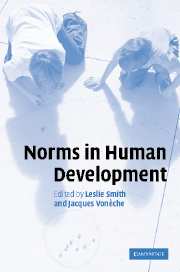Book contents
- Frontmatter
- Contents
- List of figures
- List of tables
- List of contributors
- Acknowledgments
- 1 Norms in human development: introduction
- Part I Norms and development in epistemology
- Part II Norms in moral and social development
- 6 Contextualizing moral judgment: challenges of interrelating the normative (ought judgments) and the descriptive (knowledge of facts), the cognitive and the affective
- 7 The development of obligations and responsibilities in cultural context
- 8 The multiplicity of social norms: the case for psychological constructivism and social epistemologies
- Part III Norms in cognitive development
- References
- Index
7 - The development of obligations and responsibilities in cultural context
Published online by Cambridge University Press: 22 September 2009
- Frontmatter
- Contents
- List of figures
- List of tables
- List of contributors
- Acknowledgments
- 1 Norms in human development: introduction
- Part I Norms and development in epistemology
- Part II Norms in moral and social development
- 6 Contextualizing moral judgment: challenges of interrelating the normative (ought judgments) and the descriptive (knowledge of facts), the cognitive and the affective
- 7 The development of obligations and responsibilities in cultural context
- 8 The multiplicity of social norms: the case for psychological constructivism and social epistemologies
- Part III Norms in cognitive development
- References
- Index
Summary
The normative framework
Humans can be characterized by a disposition to act, to believe and to feel in ways that are guided by norms and correspondingly by a disposition to experience certain feelings when norms are violated. Norms are fundamental to social life and the capacity to accept norms is a universal human biological and social adaptation. Norms serve the function of coordinating actions, beliefs and feelings. Broadly we can distinguish norms of rationality and moral norms (Keller & Reuss, 1984; see also Smith, this volume, Chapter 1). In line with this distinction, different domains of norms have been distinguished in a developmental context:
prudential norms referring to goal-oriented instrumental action (Fiddick, 2004);
conventional social norms referring to arbitrary behavioural regulations such as eating, dress or traffic rules (Smetana, 1982; Turiel, 1983);
moral norms referring to standards of interaction concerning others' welfare (Kohlberg, 1984; Turiel, 1983);
legal norms as a mixture of conventional and moral norms that can be enforced with legal sanctions (Cosmides & Tooby, 1992; Kohlberg, 1984).
Norms provide socially constituted reasons for actions. In terms of rationality they define what makes sense to do in view of an actor's goals in a certain situation or what is adequate in view of (conventional) social rules. In terms of morality they define what is blameworthy and wrong or permissible and praiseworthy in light of superordinate moral principles of fairness or justice, care or solidarity (Frankena, 1973), or in terms of a norm of reciprocity (Gouldner, 1960).
- Type
- Chapter
- Information
- Norms in Human Development , pp. 169 - 188Publisher: Cambridge University PressPrint publication year: 2006
- 6
- Cited by



